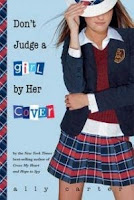Reading everyone's stories about how reading a banned or challenged book changed their lives has inspired me to share my own story.
This is not information I share often or lightly. In fact, not even my little brother has heard this story before, and I can count on one hand the number of friends who know what happened to me that summer. So know that in sharing this with you, I am giving voice to how desperately important it is to give children the freedom to read what they need, when they need it.
Speak
by Laurie Halse Anderson wasn't published until I was a senior in high school, but I wish I had that book for myself the summer after eighth grade. I had gone on a trip with some friends, and while my experience pales in comparison to what Melinda faced in the book, I was violated by someone I trusted. I felt hurt and alone and afraid--feelings I had never felt before in my life. My parents weren't there, and I found myself not knowing what to do. Luckily, there was another friend on this trip who convinced me to tell an adult what happened. My friend hugged me and told me it would be all right and then held my hand as I told someone who could help. I got counseling, I received love and support, and I was able to face what happened to me.
Not all teenagers have that same support system. And even if they do have that support system, they don't realize it's there or how to access it or what might happen if they try. What they do have are champions like Laurie Halse Anderson and Chris Crutcher and Walter Dean Myers and Ellen Hopkins. They have books they can hold in their hands. Words that are spoken and written for them when they can't do it for themselves. When kids don't feel they have someone they can lean on for support, they can find support in books. They can know they are not alone. They have a hand to hold and a voice of reason when their world feels like it's falling apart. And if they can discover this support system before anything bad ever happens to them? All the better!
By banning books, we are not protecting children. We are removing their support system. We are cutting them off at the knees before they even have a chance to stand. So the next time your child comes home with a book you don't think is appropriate for them, maybe you should ask yourself what information you're missing.
Why is my child reading that book? What does my child need from me? How can I work with that author to teach my child?
Authors don't write books to subvert a parent's authority. A publisher doesn't spend money to promote books just because they what to shock people with how far they can push the first amendment. Books are written because there is a story to tell and an audience who wants and needs to hear it.
I finally read
Speak
about five years ago. When I found the courage to pick it up, I cried myself to sleep. I cried for Melinda, and I cried for myself, and I cried for all the girls who go through the same thing we did. But I also felt hope. I felt hope that somewhere out there, a girl was reading that book and realizing she wasn't alone. I felt hope that a boy was reading it and deciding to treat his girlfriend with a little more respect. I felt hope that a parent was reading it and understanding why some things make a child fall silent. I felt hope that a teacher was reading it and finding a way to reach a student who had fallen silent.
I am currently reading
ttyl
by Lauren Myracle, one of the most frequently challenged books of 2009. In all honesty, I'm not expecting this novel to change me the way
Speak
did, but I read it in honor of those who cannot read it because it has been taken out of their libraries or classrooms or bookshelves. I read it because some children aren't silenced because of a horrible experience but because a misguided adult has chosen to silence them before they can
#SpeakLoudly.





























